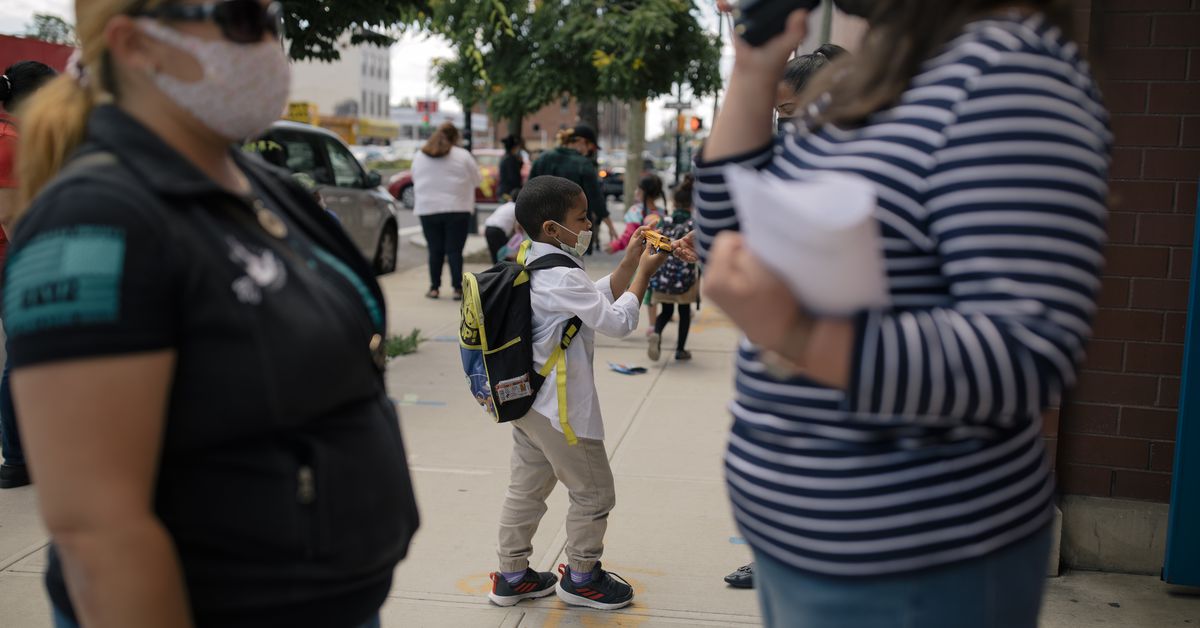Senators Press Deputy Education Secretary Nominee on School Closures, Lost Learning Time
Senators pressed President Joe Biden’s nominee for deputy U.S. Secretary of Education on issues ranging from school closures to how administrators should use a massive new infusion of federal K-12 aid at her confirmation hearing Wednesday.
If confirmed, San Diego Unified Superintendent Cindy Marten would take the number two role at the U.S. Department of Education as the agency pushes schools nationwide to expand in-person learning offerings during the COVID-19 pandemic.
In a relatively low-drama confirmation hearing with the Senate education committee, some of the toughest questions Marten faced were about why her own school system is still offering largely remote education to all but a small number of students with special learning needs.
“I can’t understand why it would be that we wouldn’t be insisting that schools would be open,” Sen. Mitt Romney, R-Utah, told Marten.
San Diego Unified is set to return to in-person learning April 12, Marten said. That plan came after she worked with local scientists to create plans to regularly test students and staff for COVID-19 and to improve ventilation and air filtration in schools.
The district also prioritized vaccinations for teachers and waited to meet California’s relatively strict metrics for school reopening that rely on the level of virus spread within the surrounding community.
“I do believe that we’ve learned that following the science, following the CDC guidance, we have a clear path forward,” Marten told senators.
She stressed the importance of local decision-making and said she can’t predict the path of the pandemic in coming months.
“This has been a tremendous challenge, and I know across the country people are grappling with the same issues we grappled with on the path to reopening,” Marten said.
Marten, a long-time educator and former elementary reading specialist, said her interest in education equity was sparked in part by her brother Charlie, an adult with developmental disabilities who was helped by the passage of what is now known as the Individuals with Disabilities Education Act.
“This pandemic did not create the inequities in our education system, but it has highlighted just how much work remains to be done,” she said, echoing similar sentiments shared by U.S. Secretary of Education Miguel Cardona.
In response to questions about a range of education issues, Marten stressed the importance of “lifting up best practices” from local school districts.
She sidestepped questions from Sen. Bill Cassidy, R-La., about whether the federal government has the authority to unilaterally forgive student loan debt, and from Sen. Lisa Murkowski, R-Alaska, about which federal education regulations she would most want to rewrite or eliminate.
Senators raise concerns about ‘learning loss’
Several senators pressed Marten on how schools should address “learning loss,” or uncompleted coursework as a result of interrupted learning time.
Marten said San Diego plans enriching summer experiences for students that go beyond traditional summer school to help them feel motivated and engaged after a difficult year.
She agreed with Sen. Tim Kaine, D-Va., that schools should consider using funds provided through the newly passed American Rescue Plan for enhanced summer learning and extended learning time in 2021 and in future years.
“That’s the kind of forward thinking that I think is important … that we are able to have an immediate reaction as well as long-term planning,” Marten said.
Asked by Murkowski about pronounced differences in the academic achievement of Black and white students in a cluster of southeast San Diego schools, Marten noted success in narrowing those gaps in the district as a whole.
Addressing such issues, she said, requires a “relentless focus” on interrupting the conditions that worsen them. She pointed to the importance of teacher coaching that is centered on the needs of individual students.
“When you learn how to teach one, you learn how to teach many more from that,” she said.
Several senators also urged Marten to address declining college interest among students of color during the pandemic, evidenced by drops in federal student loan applications, and she agreed the trend was concerning.
The nominee draws both praise and criticism
Under Marten’s leadership, the San Diego district has won praise for narrowing achievement disparities between white students and students of color and for raising graduation rates, including from the Learning Policy Institute, an organization founded by Linda Darling-Hammond, the president of the California state board of education who led Biden’s education transition team.
It’s clear Marten would be “a champion for students,” said committee chairwoman Sen. Patty Murray, D-Washington, who urged a speedy confirmation.
“Especially those [students] who have so sorely needed a champion at the department these last four years including students of color, students from families with low incomes, students with disabilities, women, LGBTQ students, English-learners, and so many others.”
Ranking member Sen. Richard Burr, R-North Carolina, said he was inclined to support Marten’s nomination. But he noted some complaints from local organizations and advocacy groups about her work, and he said those concerns would have gotten much more attention from his Democratic colleagues if she’d been nominated by a Republican president.
“I’m glad to see that my Democratic friends have abandoned their guilty-upon-nomination stance that they’ve taken the last four years,” Burr said.
Among the concerns he highlighted: The San Diego chapter of the NAACP has criticized San Diego for disciplining Black students at higher rates than their peers, an issue in school systems across the country. The local chapter of the Society of Professional Journalists has flagged concerns about transparency in San Diego Schools, Burr noted, and the district has faced investigations for its handling of sexual harassment complaints.
“Despite any reservations, I believe your passion for education and for kids to learn in the classroom will enable you to succeed,” Burr told Marten.
Marten’s nomination also faced some resistance from charter school advocates who were concerned about her involvement on a California task force that proposed changes to the state’s charter school authorizing law.
Marten said her own son had attended a charter school. She noted how San Diego had approved dozens of charters since 1993 and included them in bond campaigns to support facilities.
While the education system should create neighborhood public schools that serve as “the best first choice,” Marten said families should have options.
“At the end of the day, I believe that every child deserves to be in an environment that’s right for them and that parents deserve choices,” she said.







